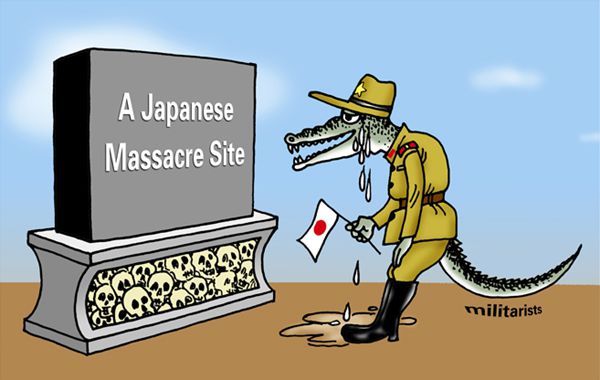Global peace faces two challenges 70 years after WWII
- By Chen Xiangyang
 0 Comment(s)
0 Comment(s) Print
Print E-mail China.org.cn, August 25, 2015
E-mail China.org.cn, August 25, 2015
|
|
|
Crocodile tears [By Gu Peili/China.org.cn] |
This year marks the 70th anniversary of victory in the Chinese People's War of Resistance Against Japanese Aggression, as well as the World Anti-Fascist War.
As a main battlefield during wartime, China will hold a range of ceremonies, including a military parade on September 3, in order to "remember history, cherish the revolutionary martyrs, hold a firm stance of peace, and look to the future."
There are four lessons we should learn:
Firstly, exclusivism and militaristic thought can lead countries onto an evil road. In the early 1930s, the multiple influences of world economic crises, problems leftover from WWI, and domestic social contradictions gave rise to political extremism. External ultra-nationalism combined with internal totalitarianism led some countries along the Fascist road.
Germany, dominated by the Nazi Party and Japan under militarism became two sources of WWII, bringing severe disaster to the world. Even nowadays, similar international situations still exist in a few countries, such as exclusive power in Europe, right-deviationism in the Japanese government, and the hegemony sought by the U.S. government.
Secondly, the "appeasement policy" adopted by some countries at the beginning of the war encouraged adventurism. To protect their narrow interests, the U.K., France and the U.S. adopted a hostile attitude towards the Soviet Union while indulging the Fascism being followed in Germany and Japan.
In Europe, the "Munich Conspiracy" between U.K., France and Germany lead to the outbreak of WWII. In Asia, the U.S. connived at Japan's aggression in northeast China until the Japanese attack at Pearl Harbor in December 1941. Recently, the U.S. again encourages Japan's attempts to contain China.
Thirdly, an Anti-Fascist united front was the key to victory. To fight against Fascism together, China, the U.S., U.K. and the Soviet Union collaborated to destroy the aggressors, Germany, Italy and Japan. In China, the Communist Party of China (CPC) and the Kuomintang (KMT) also set up a united front against Japanese aggression.
However, in order to maintain its hegemony across the world today, the U.S. seeks to contain Russia and China. Its "Cold War mentality" not only sharpens the contradiction between the U.S. and Russia, but intensifies competition with China.
Fourthly, public opinion needs to be awakened. People in Germany and Japan, at the beginning of the war, were bewitched by Fascism and militarism, and finally became victims of the war. In contrast, Soviet Union and China raised a people's war against German and Japanese aggression.







Go to Forum >>0 Comment(s)